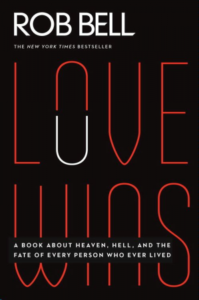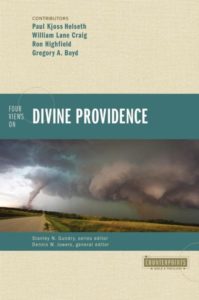Whilst reading about hell and the various views on it, I realized two things. First, that there are five major views on hell (Four Views on Hell left one out) and second, all of them have some basis in Biblical authority. People who cling to one claim it to be the authoritative stance with the most (or best) Biblical evidence backing it up. Some go so far as to say that if you don’t agree with their view you don’t take the Bible seriously. Others, like Jersak in Her Gates will Never Be Shut, are more willing to take a critical approach and end with hope rather than a determined stance.
1. Literal View (flames forever)
2. Metaphorical View (suffering forever)
3. Purgatorial (state before heaven/hell for cleansing)
4. Universalism (everyone is saved)
5. Annihilationism (unsaved are destroyed forever)
While I agree that there is a measure of faith involved in anything pertaining to the Christian life, I do think there can be certainties about some times. I will not detail all five views of hell and ultimate salvation as I’ve done that in the above-linked posts. They are listed to the right for you to refresh yourself, though. Each of these views has some basis in Biblical truth, except for the purgatorial view, so I would like to get that one dealt with first and foremost.
There is one simple verse that eliminates the idea of a traditional purgatorial view (which thinks that even the saved need to be cleansed before they can enter heaven) which is Luke 23:43 where Jesus tells one of the robbers next to him that on that day they will be together in Paradise. Now, there is simply no way that the robber could have cleansed himself enough to be perfect and allow immediate entry into paradise if there was a need for purgatory for even those who were saved. And, I don’t know about you, but I choose to listen to the words of Jesus over anyone else.
This leaves us with four views of hell, each seemingly “authoritative” according to Scripture. When I read the scriptures referring to hell I see four major things (which is where these views come from).
Hell is a real, physical place, but it is not filled with eternal fire.
The first thing I want to get out of the way is that I don’t think hell is literal fire. We are too quick to jump a literal interpretation of fire, but a metaphorical interpretation of so many other things it’s rather absurd. Do I think Hell is real? Yes. Do I think hell is a punishment for sins? Yes and no. Hell is a punishment for sin in so much as it is giving us what we’ve been asking for. When we sin we’re telling God we don’t need him. In return, God gives us that desire of removal from His presence and watch when we enter Hell upon death. It’s like when you tell your parent you hate them and they send you to your room (although more extreme). It’s a response to your desire, as well as a punishment.
What then about the punishment being death? Or everyone being saved? Jersak likes to believe that everyone will be saved in the end. He ends his book with that hope. While I hope for that, I also recognize that people still have free will. So people choose to either be saved or not. Based on texts in revelation those who are not saved upon death are given the opportunity in the afterlife, they must simply choose it. (Rev 21:6; 21:15; 22:14; 22:17)
Now, when most people view hell they see it as this place under the earth where Satan reigns and has control. Satan’s reign is on the earth, and we see in Revelation that he will also be punished, so viewing him as the master of hell is inaccurate. Revelation also depicts those that did not choose God as simply outside the city. (Rev 21:8; 21:27; 22:14-15). Follow along with me for a second. We know that in the end, everything will be under God’s domain. But hell is the place where he chooses to remove his presence so that those who choose not to love him may be given the opportunity to do so, but outside the city.
I imagine it as a beautiful city, glowing and inviting. With one entrance. There’s no night there. Everyone is welcome to enter, and to drink of the river of life, but they have to do the work. They must wash their robes to be worthy, and choose Christ over themselves.
Outside this city, but still in God’s kingdom, is hell. This is where those who have yet to choose God dwell. It’s rundown. It’s scary. Hatred, violence, and all manner of self-serving activities fill its streets. There is no love. Nobody wants to be here, but they would rather be there, serving themselves, then serving and loving God.
Hell is the ghetto of the kingdom of God.
I said this a few years ago as a half joke, but I’m finding it to be true. Hell is the part of the kingdom of God where there’s no light or love. God removes his presence from this party of the kingdom so those who want nothing to do with him can have it. Now, when these people finally choose to give up themselves and follow Christ they can enter the city. There is some form of purification process that happens. It’s described as a fire, as well as a washing of robes. (Perhaps it’s both). We simply don’t know. But we do know they are given the opportunity, even after death, to choose Christ.
But we’re still left with the nagging problem of the second death. The Bible talks about the punishment for sin being death and even says there will be a second death. How does this fit into the picture painted above? While there is a possibility that all will be saved, and God certainly desires that, there is no guarantee. We all still do have free will after all. For this reason, there is something, somewhere (outside the city, obviously) that is used to eternally destroy those whom will never come to God. We have no idea who those are (God may not even know). Perhaps it is nobody. But there is the possibility that they will choose to be destroyed forever rather than follow God.
Maybe this “lake of fire” as it’s called in the Bible is never even used. Perhaps people are given eternity to decide and they still remain in hell forever. Perhaps everyone eventually chooses to follow God. Maybe people choose willingly to go to the lake of fire because they refuse to follow God, but can’t handle hell any longer. Or maybe God gives them until a certain time then eventually says, “bye Felicia” and sentences them to the second death. There’s no way to know for sure.
But we do know that hell is real, God wants everyone to be saved, and that those who aren’t saved will be sentenced to a second death. We know that people are given a chance to choose God even after death. Beyond that, nothing else really matters. God is still in control, but he still gives us free will. We’re still punished for choosing to reject Him, but we’re given countless (perhaps endless) opportunity to follow Him, even after death.
This view does many things. It reconciles the seemingly contradictory passages about hell. It removes the “God must be evil” if he punishes everyone forever in fire for finite sins (or even metaphorical fire); it allows for universalism without downplaying the punishment of sins, and it follows annihilationism without ignoring the clear teachings of God wanting everyone to come to know him.
I know this might seem like a stretch for some of you, but, let’s be honest, most of our faith is built on things that seem like a stretch. Christ born of a virgin? Christ having the ability to sin but knowing that He never would? Christ dying and rising again in three days? Certainly, a view of hell that incorporates all the other views (save purgatory) is less stretchy than any of those.





